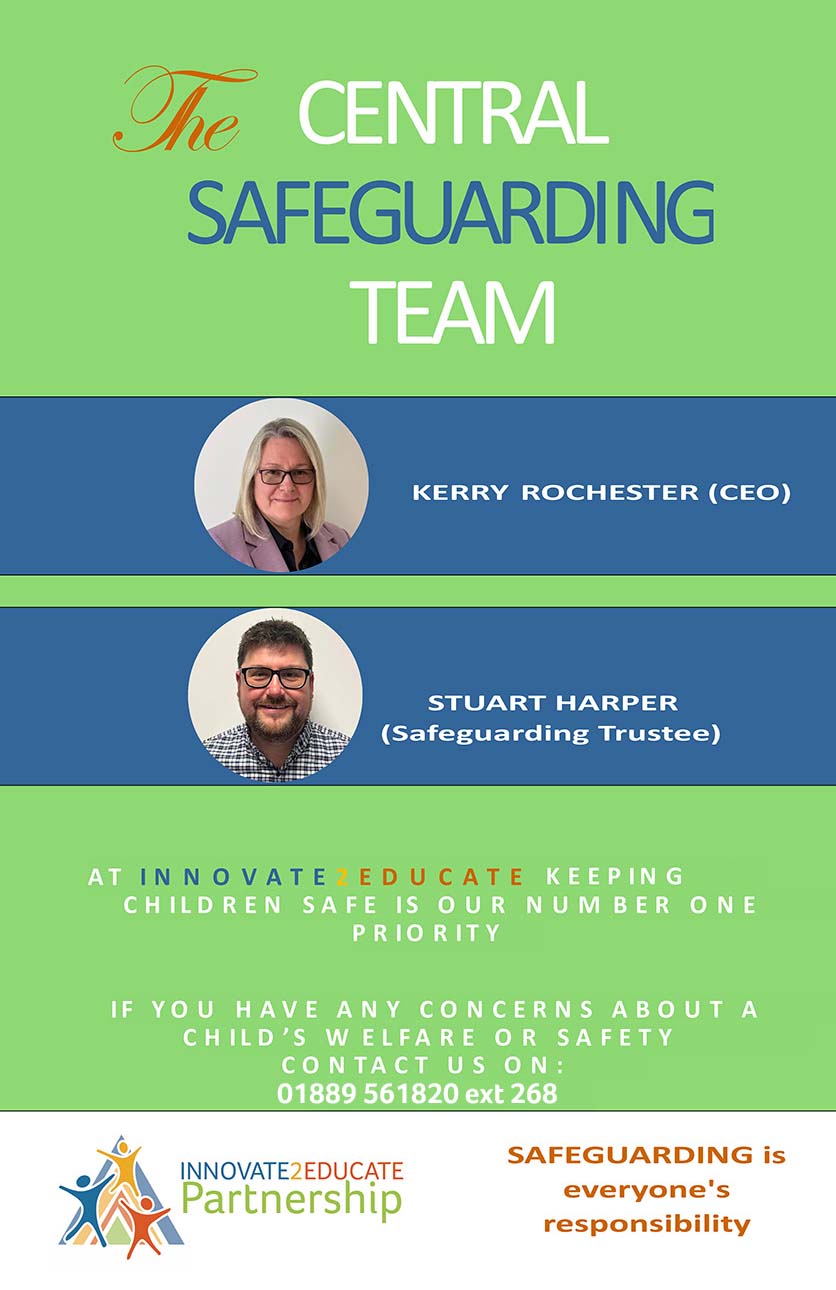Safeguarding
Safeguarding Statement of Intent
Innovate2Educate Partnership aims to promote and protect the wellbeing of the children in our care. Our first priority is always the welfare of our children.
In September each year the DfE publish a revised ‘Keeping Children Safe in Education – statutory guidance for schools and colleges’. This guidance contains information on what schools, including academies, should do and sets out the legal duties which they must comply with.
In law, individual academies are deemed to be ‘relevant partners’ of their local authority and as such are under a duty to co-operate in that local authority’s Local Safeguarding Children’s Board arrangements. Innovate2Educate Partnership ensures not only compliance at the local level but also assumes a strategic responsibility to ensure that safeguarding practice is of high quality.
The Trust has established a central Safeguarding team including a Safeguarding Trust Champion from the Trust Board to share good practices and develop the strategic Safeguarding policies and procedures of the Trust.

Statement of Intent
Innovate2Educate Partnership has developed a Statement of Intent for safeguarding across its schools to ensure all:
- Have a Designated Safeguarding Lead who has overall accountability for safeguarding in their school.
- Appoint Deputy designated safeguarding leads who are the point of contact for pupils, parents and staff for areas of responsibility including Looked after Children, Early Help and e-safety and who promote the educational achievement of vulnerable children by ensuring that staff have the skills, knowledge and understanding necessary to keeping our children safe.
- Local Governing Board meetings to review and scrutinise Safeguarding as part of their responsibilities.
- Have in place safeguarding arrangements which are designed to take account of all possible safeguarding issues including Child Sexual Exploitation, FGM (Female Genital Mutilation) and Preventing Radicalisation
- Adhere to safer recruitment practices
- Working alongside a school’s existing safeguarding processes, use MyConcern (market leading software application) to record, monitor and review child protection, safeguarding and a whole range of pastoral and welfare issues.
- Have arrangements for working together with other agencies and for sharing information with other professionals.
- Take account of their local authority’s procedures and practices established by the Local Safeguarding Children’s Board and comply with any requests from that Board.
- Have in place effective child protection, whistleblowing and staff behaviour policies and procedures.
- Develop a culture of listening to children and take account of their wishes and feelings.
- Provide appropriate supervision and support for staff including undertaking safeguarding induction and training.
- Follow clear policies for dealing with allegations against people who work with children.
- Have clear procedures in place to handle allegations of abuse against children.
- Teach children the skills they need to help safeguard themselves, including online safety through teaching and learning opportunities as part of a broad and balanced curriculum.
- Put in place appropriate safeguarding responses to children who go missing from education.
- Fulfil all their statutory responsibilities in respect of safeguarding and promoting the welfare of children.
Innovate2Educate Partnership will also:
- Monitor the quality of safeguarding practices and their impact on outcomes for children across the Trust through the Risk Management Register, Annual Safeguarding Audit and Action Plan.
- Ensure that the physical estate is safe through prioritising essential capital works and improvements identified through the safeguarding audit process and conditions surveys.
- Work with the Local Governing Boards to ensure that the performance of vulnerable children is effectively monitored, and that appropriate support is made available to those children who are at risk of achieving poor outcomes because they are a Child in Need or subject to Children’s Social Care intervention.
- Report on the outcomes of vulnerable children who are in need, subject to Child Protection plans or who are Looked After.
- Liaise with local authority lead professionals for safeguarding such as the LADO, LSCBs, Ofsted, EFA and other agencies as required.
Policy in respect of safeguarding is determined at Trust and local authority level and it is the responsibility of each school to personalise and implement such policy. Each individual school is responsible for ensuring compliance with its Local Safeguarding Children’s Board procedures and policies and for publishing its own personalised safeguarding policy in accordance with statutory requirements.

